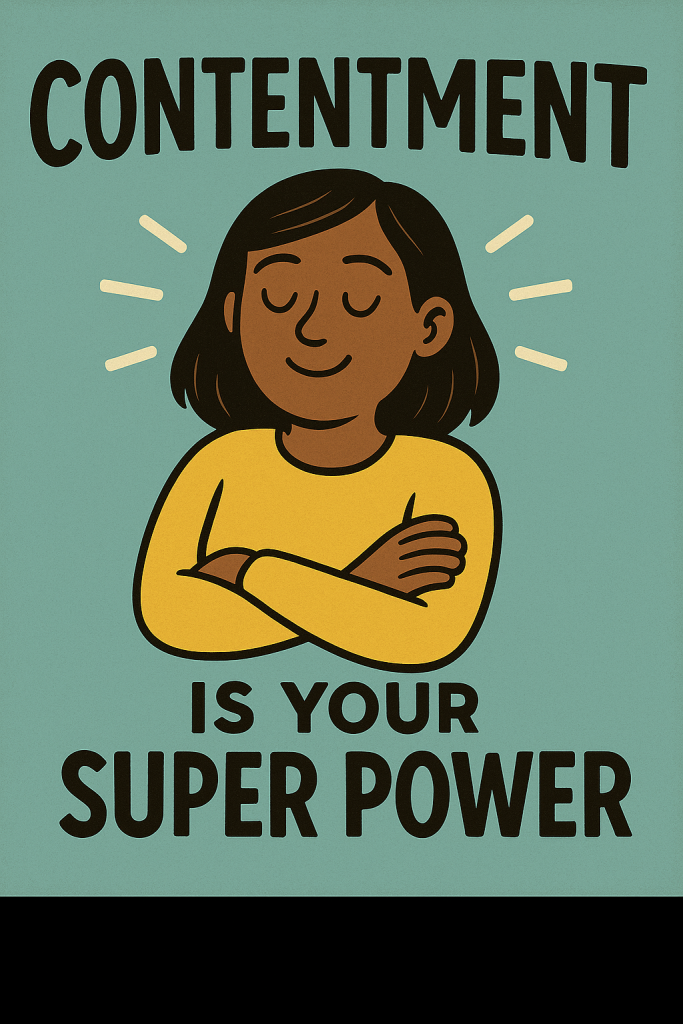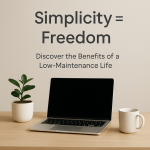A quiet strength that many overlook in a world obsessed with ambition and comparison. Imagine waking up each day not feeling like you’re behind or lacking, but grounded, grateful, and aligned with your purpose. That’s the transformative magic of contentment. It doesn’t mean settling; it means embracing what is, while still leaving room for growth.
In this blog post, we’ll explore how cultivating contentment can radically improve your mental health, relationships, productivity, and overall happiness. You’ll also learn practical steps to bring more of this powerful state into your daily life.
Why We Struggle With Contentment in Modern Life
We live in a hyperconnected world that constantly tells us we’re not enough. Social media bombards us with curated perfection. Advertisements scream that we need more—more money, more status, more stuff—to be happy. Even well-meaning self-help content can make it feel like we’re never doing enough.
The irony? The more we chase, the more anxious and dissatisfied we become.
A study published in the Journal of Social and Clinical Psychology found that limiting social media use to just 30 minutes a day significantly reduced feelings of loneliness and depression. Why? Because constant comparison breeds discontentment. Read the study here.
But here’s the thing: you don’t need to escape the world—you need to change your relationship with it. That begins with cultivating contentment.
What Is Contentment, Really?
The Subtle Difference Between Contentment and Complacency
Let’s get one thing clear—contentment is not complacency. Being content doesn’t mean giving up on your goals or living without ambition. It means you’re not dependent on external outcomes to feel worthy or at peace.
Whereas complacency stagnates, contentment stabilizes.
Think of it this way: complacency is standing still because you’re afraid or lazy. Contentment is standing strong because you’re grounded and at peace.
Contentment vs. Happiness
Another common confusion: contentment is not the same as happiness. Happiness tends to be emotion-based and fleeting—it comes and goes with external events. Contentment, on the other hand, is a deeper, more sustainable sense of peace and sufficiency.
Happiness is winning the game. Contentment is loving the game regardless of the outcome.
Defining Contentment in Psychology
Psychologists define contentment as a state of satisfaction and peace, regardless of circumstances. According to Dr. Robert Emmons, a professor of psychology at UC Davis and an expert on gratitude, contentment often stems from cultivating appreciation for the present moment rather than striving for more.
The Science Behind Why Contentment Is a Superpower
Let’s talk science. You don’t need to take this on faith—contentment literally rewires your brain and improves your well-being.
- Contentment Lowers Stress and Anxiety
Chronic stress is the root of many health issues. But according to a 2015 study in Frontiers in Psychology, mindfulness-based practices (which cultivate contentment) significantly reduce stress and anxiety levels. Contentment allows your nervous system to shift from fight-or-flight into rest-and-digest. - It Boosts Your Immune System
Yes, really. A study from Carnegie Mellon University showed that people with positive emotional styles were less likely to catch colds after being exposed to a virus. Contentment protects your body by lowering stress hormones. - It Enhances Decision-Making and Creativity
When you’re not consumed by fear or desire, you make better choices. A peaceful mind is a clear mind. Neuroscience supports this: the prefrontal cortex, the decision-making part of your brain, functions more effectively when you’re calm and centered. - Contentment Changes Brain Chemistry
Contentment is linked to sustained serotonin activity, the neurotransmitter responsible for well-being and emotional stability. Unlike dopamine—which spikes with excitement and drops quickly—serotonin supports long-term peace and mood balance. Practices like gratitude and meditation enhance serotonin levels.
What Contentment Is Not
To fully understand the superpower of contentment, it helps to get clear on what it isn’t:
- It’s not laziness – Content people can be incredibly driven; they just aren’t driven by fear or lack.
- It’s not giving up – It’s choosing peace without abandoning purpose.
- It’s not always smiling – You can be content and still experience a full range of emotions.
The key is that your baseline isn’t turmoil—it’s trust.
How to Cultivate Contentment Daily
- Start With Gratitude
Gratitude is the gateway to contentment. Every time you intentionally acknowledge something you’re grateful for—big or small—you train your brain to focus on what’s going right.
Tip: Start a simple gratitude journal. Write down three things you’re thankful for each day. Over time, you’ll notice a profound shift in your mindset.
- Practice Mindful Presence
When you’re truly present, contentment follows. Mindfulness practices like deep breathing, meditation, or simply slowing down while eating or walking can help anchor you in the now.
Try this: Spend just 5 minutes each morning sitting quietly and focusing on your breath. This tiny habit can create ripple effects in your day.
- Reframe Your Narrative
Our inner dialogue shapes our reality. If you’re constantly telling yourself you’re behind or not enough, you’ll feel that way—even if you’re doing great.
Reframe Example: Instead of saying “I’m not where I want to be,” try “I’m exactly where I need to be to learn what I need to learn.”
- Take Digital Detox Days
Regular breaks from screens—especially social media—can dramatically improve your sense of peace. Unplug to reset your nervous system and reconnect with what matters. - Get into Nature
Even brief time spent outdoors has been shown to reduce stress and boost mood. Nature reminds us that enoughness is all around us.
Real-Life Examples of Contentment as a Superpower
- The Peaceful Parent
One mom I spoke to, Sarah, said contentment transformed her parenting. “I stopped trying to be the perfect Pinterest mom,” she shared. “Instead, I focused on being present. I’m less stressed, and my kids are happier too.” - The Balanced Entrepreneur
Mike, a small business owner, used to work 80-hour weeks chasing growth. “Burnout hit hard,” he admitted. “Now I’ve built my business around values instead of vanity. I still have goals, but I don’t let them steal my peace.” - The Fulfilled Freelancer
Emma, a digital nomad, found that contentment gave her more freedom than travel ever did. “I thought I needed to be in Bali to be happy,” she laughed. “Turns out, I just needed to be okay with myself.”
Contentment in Relationships: Less Drama, More Depth
When you’re content within yourself, you’re not looking to your partner, friends, or family to fill a void. That leads to healthier boundaries, deeper connections, and less emotional turbulence.
A study in the Journal of Marriage and Family found that self-acceptance and inner peace were strong predictors of relationship satisfaction—often more so than communication skills.
When you embody the idea that contentment is your superpower, you bring calm energy into your relationships. And calm is magnetic.
Debunking the Myths Around Contentment
- Myth #1: Contentment Means Settling for Less
Truth: Contentment means being okay now while still pursuing better. It’s the fuel for sustainable growth, not a barrier to ambition. - Myth #2: You Can Only Be Content Once You’ve “Made It”
Truth: Contentment isn’t a reward for success—it’s a precondition for it. Inner peace allows you to show up more powerfully in your life, work, and relationships. - Myth #3: Content People Lack Drive
Truth: Some of the most content people are also the most productive. Why? Because they’re not drained by comparison or stress. They channel their energy wisely.
Contentment and Minimalism: A Perfect Match
Minimalism isn’t about owning nothing—it’s about being intentional with what you allow into your life. When paired with contentment, minimalism becomes a powerful life philosophy.
Joshua Becker, author of The More of Less, writes: “You don’t need more space, more stuff, or more achievements. You need more intention.”
If you’re intrigued by this mindset, check out our full guide on the benefits of a low-maintenance life and how simplifying your space can lead to more inner peace.
How to Tell You’re Growing in Contentment
Here are some signs that you’re embracing the power of contentment:
- You feel less urgency to prove yourself.
- You no longer compare your journey to others’.
- You enjoy the present moment more often.
- You pursue goals without attachment to outcomes.
- You make decisions based on peace, not pressure.
Sound familiar? You’re well on your way.
Action Steps to Start Living With Contentment
If you’re ready to tap into this superpower, here are some practical steps:
- Create a Contentment Ritual
Set aside 10 minutes daily to check in with yourself. Journal, meditate, or simply reflect on what’s good. Make it non-negotiable. - Limit Your Exposure to Triggers
Unfollow accounts that make you feel less than. Say no to comparison traps. Turn off notifications. Curate your digital life. - Set Value-Based Goals
Instead of chasing what “looks good,” chase what feels aligned. Goals rooted in your values are more fulfilling—and less stressful.
Final Thoughts: Why Contentment Is Your Superpower
Here’s the truth most people miss: You don’t need to be more, do more, or have more to be worthy. Contentment isn’t a consolation prize—it’s your competitive edge. It helps you stand firm when the world pulls you in every direction. It keeps your mind clear, your heart full, and your energy focused.
When you embrace contentment, you become unshakable. And in a world of chaos, that’s a true superpower.



